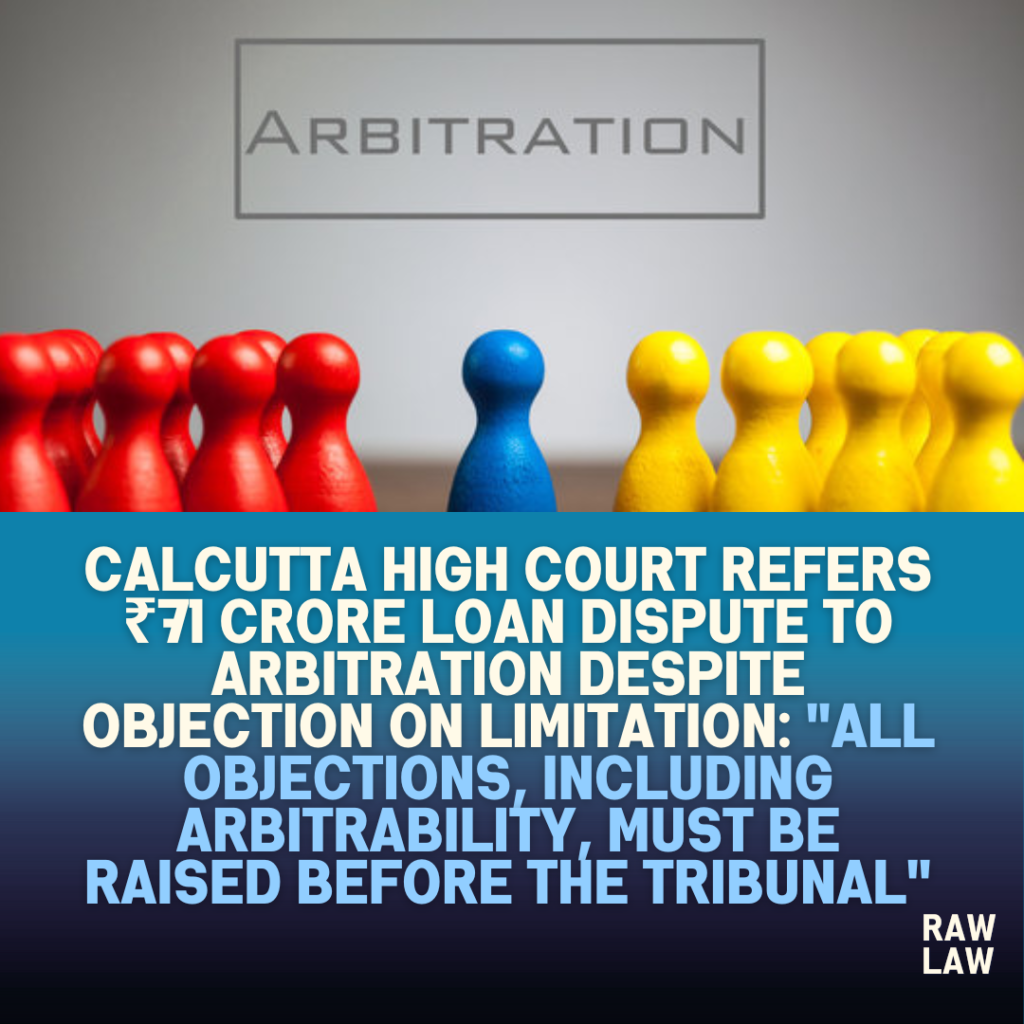Court’s Decision:
In SREI Equipment Finance Limited v. Krishna Arjun Enterprise & Ors., the Calcutta High Court referred a ₹71 crore loan recovery dispute to arbitration, rejecting objections related to limitation and arbitrability. Justice Shampa Sarkar held that “all questions and objections available to the parties, including the arbitrability of the claim, shall be decided by the learned arbitrator.” The Court appointed Justice Dilip Kumar Seth (Retd.) as sole arbitrator under Section 11 of the Arbitration and Conciliation Act, 1996.
Facts:
The petitioner extended a ₹56 crore loan to an unregistered partnership firm via a facility agreement dated September 5, 2018. The agreement contained an arbitration clause (Clause 9.11). Personal guarantees were executed on the same day by respondent nos. 2 and 3, incorporating the arbitration clause by reference. After payment of the 21st instalment and partial 22nd instalment, no further payments were made post-March 31, 2020. A demand notice of ₹71.2 crore was issued on January 1, 2023, followed by termination on January 17, 2023. Arbitration was invoked via notice dated March 22, 2023.
The first application for appointment of arbitrator was withdrawn due to procedural defects, and this was the second such application.
Issues:
- Whether a valid arbitration agreement existed covering both the borrower and guarantors?
- Whether the arbitration clause extended to the deed of personal guarantee?
- Whether the dispute was barred by limitation?
- Whether the invocation of arbitration was proper?
Petitioner’s Arguments:
The petitioner contended that the arbitration clause covered both the borrower and guarantors, as the guarantee deed explicitly incorporated it. It was argued that the limitation objections were triable issues for the arbitrator to decide. The respondents had failed to dispute the arbitration clause’s applicability, nor had they denied execution of the agreements. The petitioner relied on the default post-22nd instalment, the demand notice, and the invocation of arbitration, asserting it was within the extended limitation period due to the Supreme Court’s suo motu extension.
Respondent’s Arguments:
The respondents claimed that the entire loan had been repaid long ago and that the petitioner’s demand was inflated, vague, and time-barred. They argued that no payments were made within three years from the agreement, thus defeating any claim of limitation extension under Section 19 of the Limitation Act. They also contended that invocation of arbitration was improper as the guarantee deed was an independent agreement, and no separate invocation was made for the guarantors.
Analysis of the Law:
The Court reiterated that under Section 11 of the Arbitration Act, it was only required to prima facie examine the existence of an arbitration agreement. It held that the deed of guarantee was intrinsically connected to the facility agreement, as it expressly incorporated its terms, including the arbitration clause.
Precedent Analysis:
- Chandra Chur Mukherjee v. Indian Oil Corporation Ltd. and WBPDCL v. Sical Mining Ltd. — Not applicable as those involved appointment of arbitrator without notice.
- Sant Lal Mahton v. Kamla Prasad — Distinguished; it was not the petitioner’s case that limitation was saved by part payment.
- ASF Buildtech Pvt. Ltd. v. Shapoorji Pallonji — Relied upon to state that questions of joinder, non-signatory inclusion, and jurisdiction are to be determined by the arbitral tribunal under Section 16.
- Aslam Ismail Khan Deshmukh v. ASAP Fluids Pvt. Ltd. (2025) 1 SCC 502 — Cited to underscore that time-bar issues and jurisdictional objections fall within the arbitrator’s domain.
Court’s Reasoning:
The Court held that all objections—on limitation, misjoinder, calculation errors, and validity of the arbitration clause—were factual and legal issues to be raised before the arbitrator. It observed that even if the first invocation appeared beyond limitation, the petitioner could avail of the benefit of the Supreme Court’s COVID-19 limitation extension order. It clarified that the guarantee deed, by reference, incorporated the arbitration clause, forming a composite agreement.
Conclusion:
The Court referred the matter to arbitration, appointing Justice Dilip Kumar Seth (Retd.) as sole arbitrator. It left all issues, including arbitrability, limitation, and joinder of parties, to be adjudicated by the arbitrator.
Implications:
This order reinforces the minimal intervention policy of referral courts under Section 11. It affirms that even complex issues like limitation and arbitrability should be decided by arbitrators, not courts. It also underscores the binding nature of incorporated arbitration clauses in guarantee deeds.
Linked Judgments Referred:
- ASF Buildtech Pvt. Ltd. v. Shapoorji Paloonji (2025 SCC OnLine SC 1016) – Held that jurisdictional issues including joinder/misjoinder are for arbitral tribunals.
- Aslam Ismail Khan Deshmukh v. ASAP Fluids Pvt. Ltd. (2025) 1 SCC 502 – Stated that referral courts need only confirm the existence of arbitration agreement.
- Sant Lal Mahton (1951 SCC 1008), WBPDCL v. Sical Mining (2015 SCC OnLine Del 1430), Chandra Chur Mukherjee (2012 SCC OnLine Cal 1423) – Distinguished as inapplicable.
